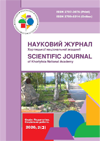UDC 159.9:316.4 CREATING SAFE EDUCATIONAL ENVIRONMENT IN EDUCATIONAL INSTITUTIONS THAT IMPLEMENT INCLUSIVE EDUCATION BY INTRODUCING SCHOOL MUTUAL UNDERTANDING SERVICE IN THEIR LEARNING PROCESS
DOI: https://doi.org/10.51706/2707-3076-2020-3-5
Abstract
Ukraine The article notes that in recent years Ukraine has identified new priorities for the development of its education system. Since 2018, the concept of the New Ukrainian School has been introduced in general secondary education institutions. There has been created an appropriate legal framework, and practical reforms in the field of education have begun, i.e. the Ukrainian school must change radically. One of the priorities of the state's development is inclusive education, which is one of the main factors in reforming the system of institutional care and upbringing of children in Ukraine. This means that in general educational institutions in classrooms different children will learn and interact together, including children with special educational needs. The goal of educational institutions is the all-round development of any child, creating conditions for the assimilation of effective models of behavior with peers, taking into account all the features of the development of each individual child. However, frequent occurrences of violence, bullying and a high level of conflict among peers do not allow schoolchildren to fully achieve their goals. The article considers the problems that students may face during the educational process in inclusive learing institutions; one of the issues is bullying in the children's community. The authors analyzed the legislation of Ukraine on combating bullying. They outlined the measures of preventive work of teachers to prevent bullying. As a result, the prevention of bullying in educational institutions contributes to the improvement of the microclimate in communities and the creation of a safe educational environment in educational institutions. The establishment of school services of mutual understanding and implementation of a restorative approach can improve the socio-psychological microclimate in school (or higher educational institution) communities, creating a safe environment for all participants of the educational process, because it is a well-established process of interaction between mediators, an efficient way of peacebuilding and nonviolent communication.


